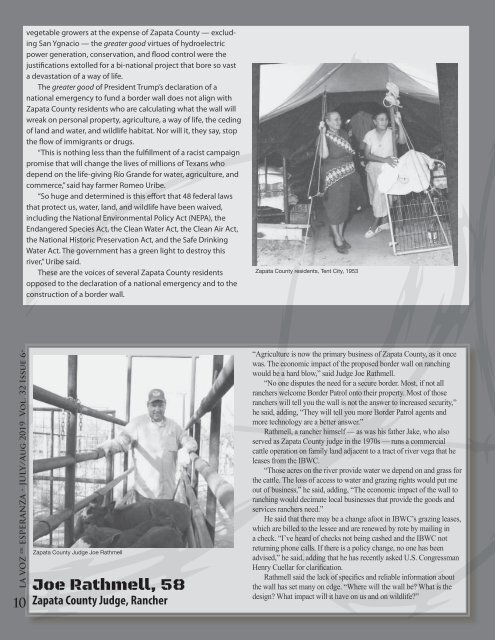La Voz - July Aug 2019
A National Emergency: To Protect & Preserve the Rio Grande by Melissa R. Cigarroa and Tricia Cortez • Traduire les Frontières/Translating Borders by Norma Cantú • (Our Lady of the Lake English/Creative Writing/Social Justice submissions: Prayer in the Shape of a Gun by s.t.shimi, The Noise of Highway 90 by Larissa Hernández, Rice by Emily Yglesias, Nuestro Westside by Samantha Ceballos • The Dungeons by Josefina Beatriz Longoria • Asylum by Arrie B. Porter) • WRITING ON THE WALL: Zapata County residents speak up about the wall; prospect of losing land evokes greater good takings for 1950s Falcon Dam construction by Maria Eugenia Guerra • Re-Rethinking Impeachment After the Mueller Report by Elliot Benjamin, Ph.D. • “The Status of Women in San Antonio”: An Overview Of The Report by Rogelio Sáenz and Lily Casura • Low Income Tenants Organizing For Justice by Pancho Valdez & James Hamilton
A National Emergency: To Protect & Preserve the Rio Grande by Melissa R. Cigarroa and Tricia Cortez • Traduire les Frontières/Translating Borders by Norma Cantú • (Our Lady of the Lake English/Creative Writing/Social Justice submissions: Prayer in the Shape of a Gun by s.t.shimi, The Noise of Highway 90 by Larissa Hernández, Rice by Emily Yglesias, Nuestro Westside by Samantha Ceballos • The Dungeons by Josefina Beatriz Longoria • Asylum by Arrie B. Porter) • WRITING ON THE WALL: Zapata County residents speak up about the wall; prospect of losing land evokes greater good takings for 1950s Falcon Dam construction by Maria Eugenia Guerra • Re-Rethinking Impeachment After the Mueller Report by Elliot Benjamin, Ph.D. • “The Status of Women in San Antonio”: An Overview Of The Report by Rogelio Sáenz and Lily Casura • Low Income Tenants Organizing For Justice by Pancho Valdez & James Hamilton
You also want an ePaper? Increase the reach of your titles
YUMPU automatically turns print PDFs into web optimized ePapers that Google loves.
vegetable growers at the expense of Zapata County — excluding<br />
San Ygnacio — the greater good virtues of hydroelectric<br />
power generation, conservation, and flood control were the<br />
justifications extolled for a bi-national project that bore so vast<br />
a devastation of a way of life.<br />
The greater good of President Trump’s declaration of a<br />
national emergency to fund a border wall does not align with<br />
Zapata County residents who are calculating what the wall will<br />
wreak on personal property, agriculture, a way of life, the ceding<br />
of land and water, and wildlife habitat. Nor will it, they say, stop<br />
the flow of immigrants or drugs.<br />
“This is nothing less than the fulfillment of a racist campaign<br />
promise that will change the lives of millions of Texans who<br />
depend on the life-giving Río Grande for water, agriculture, and<br />
commerce,” said hay farmer Romeo Uribe.<br />
“So huge and determined is this effort that 48 federal laws<br />
that protect us, water, land, and wildlife have been waived,<br />
including the National Environmental Policy Act (NEPA), the<br />
Endangered Species Act, the Clean Water Act, the Clean Air Act,<br />
the National Historic Preservation Act, and the Safe Drinking<br />
Water Act. The government has a green light to destroy this<br />
river,” Uribe said.<br />
These are the voices of several Zapata County residents<br />
opposed to the declaration of a national emergency and to the<br />
construction of a border wall.<br />
Zapata County residents, Tent City, 1953<br />
LA VOZ de ESPERANZA • JULY/<strong>Aug</strong> <strong>2019</strong> Vol. 32 Issue 6•<br />
10<br />
Zapata County Judge Joe Rathmell<br />
Joe Rathmell, 58<br />
Zapata County Judge, Rancher<br />
“Agriculture is now the primary business of Zapata County, as it once<br />
was. The economic impact of the proposed border wall on ranching<br />
would be a hard blow,” said Judge Joe Rathmell.<br />
“No one disputes the need for a secure border. Most, if not all<br />
ranchers welcome Border Patrol onto their property. Most of those<br />
ranchers will tell you the wall is not the answer to increased security,”<br />
he said, adding, “They will tell you more Border Patrol agents and<br />
more technology are a better answer.”<br />
Rathmell, a rancher himself — as was his father Jake, who also<br />
served as Zapata County judge in the 1970s — runs a commercial<br />
cattle operation on family land adjacent to a tract of river vega that he<br />
leases from the IBWC.<br />
“Those acres on the river provide water we depend on and grass for<br />
the cattle. The loss of access to water and grazing rights would put me<br />
out of business,” he said, adding, “The economic impact of the wall to<br />
ranching would decimate local businesses that provide the goods and<br />
services ranchers need.”<br />
He said that there may be a change afoot in IBWC’s grazing leases,<br />
which are billed to the lessee and are renewed by rote by mailing in<br />
a check. “I’ve heard of checks not being cashed and the IBWC not<br />
returning phone calls. If there is a policy change, no one has been<br />
advised,” he said, adding that he has recently asked U.S. Congressman<br />
Henry Cuellar for clarification.<br />
Rathmell said the lack of specifics and reliable information about<br />
the wall has set many on edge. “Where will the wall be? What is the<br />
design? What impact will it have on us and on wildlife?”





